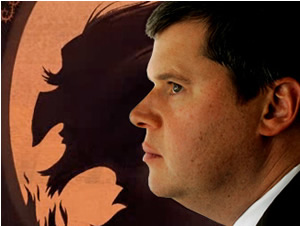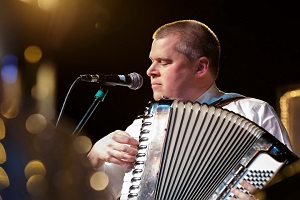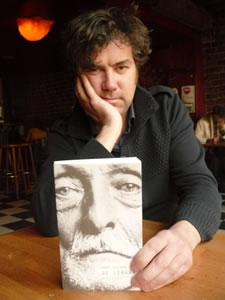De Zwitserse schrijver Martin Suter werd geboren op 29 februari 1948 in Zürich. Zie ook mijn blog van 29 februari 2008 en ook mijn blog van 28 februari 2009.
Uit: Unter Freunden
„Das also ist Meuli, denkt Haberstich, als er Brachingers Büro betritt. Der neue Mann sitzt auf dem Besprechungssofa und steht jetzt auf, um ihm die Hand zu schütteln. Brachinger bleibt sitzen. Zwei leere Kaffeetassen und ein paar zerknüllte Schokopapierchen verraten, dass die beiden schon länger zusammensitzen. Aha, ich bin also nachträglich dazugebeten worden. Wahrscheinlich nachdem die vertraulichen Themen besprochen waren, fährt es Haberstich durch den Kopf.
So sieht er also aus, der Mann, der ihm gefährlich werden könnte. Grösser, als er ihn sich vorgestellt hat. Und jünger. Und mit mehr Haaren. Im ersten Vergleich mit sich selbst schneidet der andere, ehrlich gesagt, etwas besser ab. Äusserlich. Obwohl: Auf der rechten Schulter scheinen ein paar Schuppen zu liegen. Das ist die Kehrseite von dichtem Haarwuchs – Schuppen.
Von seinem Sessel aus verfolgt Brachinger die Begrüssungsszene. Haberstich spürt, wie auch er vergleicht. Damit wird er jetzt leben müssen: Mit Meuli verglichen zu werden. Nun, ihm soll’s recht sein. Er hat keine Vergleiche zu fürchten. Wenigstens keine fachlichen. Und was die äussere Erscheinung angeht: So übel sieht er auch nicht aus. Er hat einfach keine Zeit für Bodyshaping und Hairstudios. Wichtig ist einfach, dass er schon bei der ersten direkten Begegnung gut abschneidet. Er muss Brachinger alerter, reaktionsschneller, informierter und schlagfertiger vorkommen als der Neue. Er muss von Anfang an die Diskrepanz in allen Belangen (ausser vielleicht den äusserlichen) deutlich machen.“
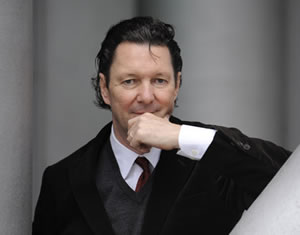
Martin Suter (Zürich 29 februari 1948)
De Griekse dichter Yórgos Seféris werd geboren in Smyrna (nu Izmir, in Turkije) op 29 februari 1900. Zie ook mijn blog van 19 februari 2007 en ook mijn blog van 29 februari 2008 en ook mijn blog van 28 februari 2009.
The Leaf of the Poplar
It trembled so, the wind set it sailing
it trembled so, how could it not yield to the wind
far beyond
the sea
far beyond
an island in the sun
and hand gripping oars
dying the last stroke at the sighting of port
tired eyes closing
like sea anemones
It trembled so much
I sought it so much
in the shade of the eucalyptus
Spring to Autumn
bare in the close woods
my God I sought it.
Lost worlds
How can you gather together
the thousand fragments
of each person?
What’s wrong with the rudder?
The boat inscribes circles
and there’s not a single gull.
The world sinks:
hang on, it’ll leave you
alone in the sun.
You write:
the ink grew less,
the sea increases.
The body that hoped to flower like a branch,
to bear fruit, to become like a flute in the frost —
imagination has thrust it into a noisy bee-hive
so that musical time can come and torture it.
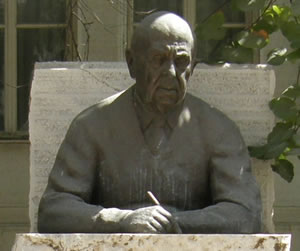
Yórgos Seféris (29 februari 1900 – 20 september 1971)
De Amerikaanse dichter en literatuurdocent Howard Nemerov werd geboren op 29 februari 1920 in New York. Zie ook mijn blog van 29 februari 2008. en ook mijn blog van 28 februari 2009.
Casting
The waters deep, the waters dark,
Reflect the seekers, hide the sought,
Whether in water or in air to drown.
Between them curls the silver spark,
Barbed, baited, waiting, of a thought–
Which in the world is upside down,
The fish hook or the question mark?
Style
Flaubert wanted to write a novel
About nothing. It was to have no subject
And be sustained upon the style alone,
Like the Holy Ghost cruising above
The abyss, or like the little animals
In Disney cartoons who stand upon a branch
That breaks, but do not fall
Till they look down. He never wrote that novel,
And neither did he write another one
That would have been called La Spirale,
Wherein the hero’s fortunes were to rise
In dreams, while his walking life disintegrated.
Even so, for these two books
We thank the master. They can be read,
With difficulty, in the spirit alone,
Are not so wholly lost as certain works
Burned at Alexandria, flooded at Florence,
And are never taught at universities.
Moreover, they are not deformed by style,
That fire that eats what it illuminates.
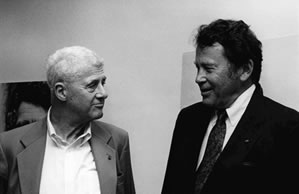
Howard Nemerov (29 februari 1920 – 5 juli 1991)
Hier (l) met collega dichter Richard Wilbur
De Franse schrijver en filosoof Ernest Renan werd op 28 februari 1823 geboren in Tréguier in Bretagne uit een vissersfamilie. Zijn vader was een vurig republikein, terwijl zijn moeder uit een royalistische familie stamde. Deze tweespalt heeft Renan zijn gehele leven gevoeld. In 1838 ging Renan na succesvolle schoolresultaten studeren aan het kerkelijk college van Saint-Nicolas du Chardonnet in Parijs. Met zijn achtergrond van een streng, Bretons katholicisme vond hij hier de stijl te spitsvondig. Hij hoopte meer degelijkheid te vinden op het seminarie van Issy-les-Moulineaux waar hij in 1840 begon. Door kennis te maken met de filosofie en de taalkunde werd zijn moeite om te geloven echter steeds groter, zodat hij uiteindelijk afzag van een religieus leven en ging werken als onderwijzer. Ondertussen zette hij zijn studie voort met name van de Semitische talen. In 1847 leverde dit hem een prijs op en een positie aan het lycée van Vendôme. In 1878 werd Renan verkozen tot lid van de Académie française. Één der bekendste werken van Renan, al tijdens zijn leven, was Het leven van Jezus (Frans: ‘La vie de Jésus’, 1863).
Uit: La poésie des races celtiques
„Lorsqu’en voyageant dans la presqu’île armoricaine on dépasse la région, plus rapprochée du continent, où se prolonge la physionomie gaie, mais commune, de la Normandie et du Maine, et qu’on entre dans la véritable Bretagne, dans celle qui mérite ce nom par la langue et la race, le plus brusque changement se fait sentir tout à coup. Un vent froid, plein de vague et de tristesse, s’élève et transporte l’âme vers d’autres pensées ; le sommet des arbres se dépouille et se tord ; la bruyère étend au loin sa teinte uniforme ; le granit perce à chaque pas un sol trop maigre pour le revêtir ; une mer presque toujours sombre forme à l’horizon un cercle d’éternels gémissements. Même contraste dans les hommes : à la vulgarité normande, à une population grasse et plantureuse, contente de vivre, pleine de ses intérêts, égoïste comme tous ceux dont l’habitude est de jouir, succède une race timide, réservée, vivant toute au dedans, pesante en apparence, mais sentant profondément et portant dans ses instincts religieux une adorable délicatesse. Le même contraste frappe, dit-on, quand on passe de l’Angleterre au paya de Galles, de la basse Écosse, anglaise de langage et de mœurs, au paya des Gaëls du Nord, et aussi, avec une nuance sensiblement différente, quand on s’enfonce dans les parties de l’Irlande où la race est restée pure de tout mélange avec l’étranger. Il semble que l’on entre dans les couches souterraines d’un autre âge, et l’on ressent quelque chose des impressions que Dante nous fait éprouver quand il nous conduit d’un cercle à un autre de son enfer.“
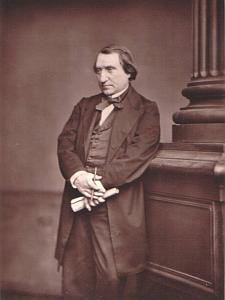
Ernest Renan (28 februari 1823 – 12 oktober 1892)
Zie voor onderstaande schrijver ook mijn blog van 28 februari 2009.
De Mexicaanse schrijver, filosoof en politicus José Vasconcelos Calderón werd geboren in Oaxaca op 28 februari 1882
